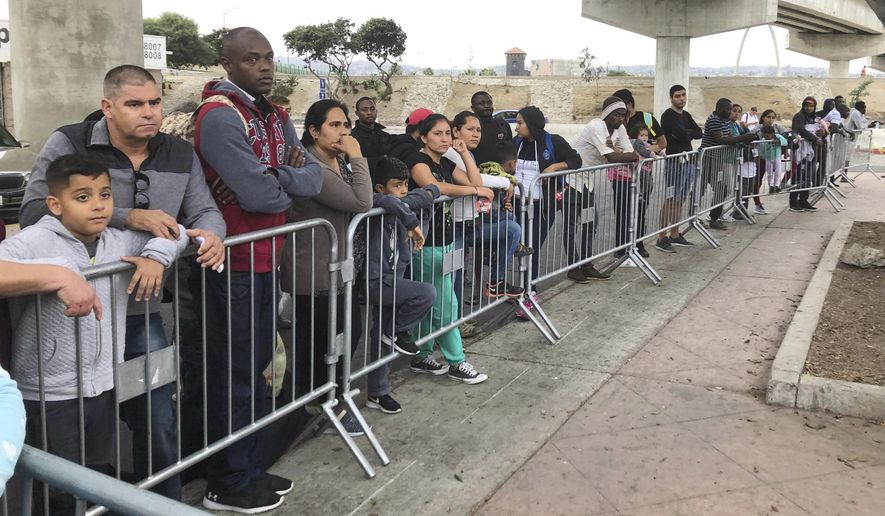A federal appeals court expressed skepticism Tuesday over the Trump administration’s policymaking some asylum-seekers wait in Mexico, saying it’s troubling the government doesn’t even ask the migrants whether they might be in danger if they are forced back across the border.
“You don’t even ask whether they have any kind of fear,” Judge William A. Fletcher told the government’s lawyer, as he and the others on the three-judge panel of the 9th U.S. Circuit Court of Appeals pondered how to fix things.
At issue is the administration’s Migrant Protection Protocols, a key part of the president’s attempt to stop the flow of migrants from Central America surging across Mexico en route to the U.S. with bogus asylum claims.
Under the MPP, Homeland Security is making many of them return to Mexico and wait for their court dates in U.S. immigration courts. The philosophy is twofold — if they crossed Mexico, they have no fear of that country, and making them wait outside the U.S. could discourage those without legitimate claims from attempting to make the journey.
Immigrant-rights advocates say the policy, dubbed “Return to Mexico,” is unfair and even dangerous for some of the migrants who have legitimate fears and for whom waiting in Mexico could be just as treacherous as being in their home countries.
At least two of the judges during oral argument in the 9th Circuit on Tuesday were sympathetic to that complaint.
“You’re giving them nothing, that is to say you’re not even asking them the key question … that is to say, are you afraid?” Judge Fletcher prodded Scott Stewart, the deputy assistant attorney general defending the policy.
Migrants who do express fear of waiting in Mexico are allowed into the U.S.
Mr. Stewart said the administration figures migrants will volunteer the information on their own, and there’s no need to prod them with specific questions.
“Someone can raise this claim at any time,” he said.
Judge Fletcher said it was “speculation” that people would come forward on their own.
Both U.S. law and treaties the country has signed prohibit the government from sending refugees to any country where they face persecution or abuse.
The Trump administration acknowledges that restriction, but says there’s a difference between permanently sending someone back to their home country they fled, and asking them to wait in a third country they just crossed through.
Judy Rabinowitz, a lawyer for the American Civil Liberties Union who argued against the Trump administration Tuesday, said the government should still ask whether migrants believe they could be harmed by being returned — even temporarily — to Mexico.
She also said she wants the standards lowered so it’s easier to prove fear, and she questioned the speedy nature of the government’s decisions.
“You have no time to prepare, you have no notice you should even be talking about your fear of return to Mexico, if you have an attorney you can’t even consult with that attorney,” she told the court.
Mexico says it did not agree to the MPP, but is still working to accommodate U.S. efforts by offering protections to the people the U.S. is shipping back across the border.
A district court had blocked the MPP earlier this year but another panel of the 9th Circuit lifted that block, ruling the policy could take effect while the case was being battled.
The panel Tuesday did not issue an immediate ruling.
• Stephen Dinan can be reached at sdinan@washingtontimes.com.




Please read our comment policy before commenting.